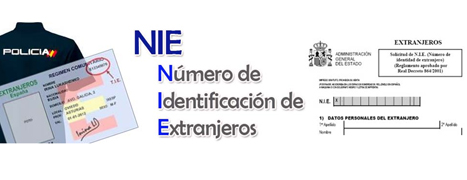The NIE is the Numero de Identificacion de Extranjero, the identification number for foreigners living in Spain who do not have Spanish citizenship, and those who have business or other interests in Spain to use as identification.

The NIE is essential because it has to be on all documents relating to Spanish law and governance AS WELL as the passport numbers. The NIE number does not change (unlike a UK passport number). You will need it it to pay tax, get work, buy or sell a car, buy or sell a house, any economic activities such as mortgages or legal claims. And you must have it to change your driving license into a Spanish one.
Do not confuse this number with the DNI, the Documento Nacional de Identidad, this is for Spanish citizens.
The NIE is not a valid way of identifying yourself, you need photo ID for that
There are three ways to get your NIE
-
In person at specific police stations
-
The Spanish embassy of your country
-
through a legal authorized person, ie a solicitor through power of attorney,
If you do an internet search you will see companies that offer to do this for you, they save no time, can often make matters more complicated, and charge for the pleasure, avoid them is my advice.
This will be your first opportunity to see how different each region of Spain operates, so you will need to to go to the correct National Police station for your area, taking everything you possibly can in case they ask for it.
Here is the list of the right police stations to get your NIE, go to the one in your area even if another one is closer, ie, if you live in the Province of Malaga, go to the Malaga one, not the possibly closer one in a neighbouring province: https://www.policia.es/documentacion/oficinas/oficinas_extran.html
Firtsly you will need a filled in EX-15 form, available for download here: http://www.exteriores.gob.es/Embajadas/PRAGA/Documents/Formulario%20EX-15.pdf you will definitely need 2 photos, your passport plus a photocopy of the opened photo page. This is a link to a translated EX-15 form http://www.exteriores.gob.es/Consulados/EDIMBURGO/en/Consulado/Documents/Guide%20to%20fill%20EX-15%20form.jpg
There is a fee of just short of 10 euros, some areas accept online payment, others don't, so I think it best to take the form the police station will give you and go to the nearest bank and pay it, then take back the receipt to the police station. I had to go to two banks because the first one said it was not 'their day for collecting the fee'.
Make a day of it, go early in the morning, clutch your google translate on your mobile (having used it to fill in the forms) and smile smile smile. Then have lunch and delightful stroll with your NIE tucked in your wallet.
Think how frightened a Spanish person would be trying to get a parking permit if they had no English, but the council would just try and do their duty, and so it is for the Spanish bureaucracy, there is no malice, just an incomprehension of what we want. Smile smile smile.